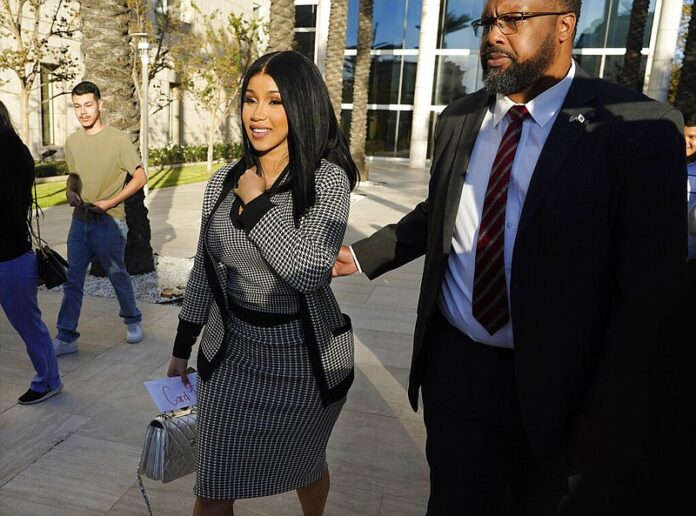
Core Insights
- Legal Victory for Plaintiffs: Texas federal judge Fred Biery ruled that copyright infringement claims against Cardi B’s “Enough” contain sufficient merit to proceed to trial, rejecting the rapper’s motion to dismiss.
- High-Stakes Financial Exposure: The $50 million lawsuit threatens significant financial consequences for Cardi B, her production team, and major record labels Atlantic Records and Warner Music Group.
- Strategic Timing Concerns: The legal ruling coincides with Cardi B’s return to solo music with “Outside” (June 20), potentially overshadowing her artistic comeback with prolonged litigation.
By Samuel Lopez – USA Herald
The legal storm surrounding Cardi B’s hit single “Enough (Miami)” has intensified dramatically, as a Texas federal judge delivered a crushing blow to the Grammy-winning rapper’s defense strategy by allowing a $50 million copyright lawsuit to proceed toward trial.
U.S. District Judge Fred Biery’s recent ruling represents a significant legal setback for Cardi B, whose attorneys had aggressively pursued dismissal of the copyright infringement claims. The judge’s decision effectively validates the core allegations brought by producers Joshua Fraustro and Miguel Aguilar, professionally known as Kemika1956, who claim their instrumental track “Greasy Frybread” was unlawfully appropriated for Cardi’s 2024 single.
“The court finds plaintiffs have alleged sufficient facts to state a claim for copyright infringement,” Judge Biery wrote in his ruling, according to court documents reviewed by USA Herald. This judicial determination suggests the similarities between the two tracks are substantial enough to warrant full legal examination.
The controversy traces back to early 2024 when Cardi B released “Enough (Miami),” a track that quickly gained mainstream attention. However, Fraustro and Aguilar assert their instrumental composition “Greasy Frybread”predates Cardi’s release and was already gaining recognition through its feature in the acclaimed FX series “Reservation Dogs” and subsequent YouTube publication.
The plaintiffs’ legal team has constructed their case around the fundamental principle of copyright protection in the music industry, arguing that the instrumental foundation of “Enough” bears unmistakable similarities to their original work. Their $50 million damage claim reflects not only the commercial success of Cardi’s track but also the potential future earnings lost due to the alleged infringement.
The lawsuit extends beyond Cardi B herself, encompassing a network of music industry professionals and corporate entities. Co-producers OG Parker and DJ SwanQo, who contributed to “Enough,” face direct legal exposure alongside major record labels Atlantic Records and Warner Music Group. This broad legal targeting demonstrates the plaintiffs’ strategy to pursue maximum financial recovery while ensuring comprehensive accountability across the production chain.
The inclusion of major record labels in the lawsuit highlights the significant financial stakes involved. Atlantic Records and Warner Music Group possess substantial resources to mount vigorous legal defenses, but they also face potential reputation damage and costly litigation expenses regardless of the ultimate outcome.
The legal ruling’s timing creates complex strategic challenges for Cardi B’s career trajectory. Just days after Judge Biery’s decision, the Bronx rapper released “Outside” on June 20, marking her first solo single of 2024. Produced by Charlie Heat and HeyMicki, the track addresses personal themes including her relationship with Offset and connections to NFL star Stefon Diggs.
Industry observers note that prolonged litigation could overshadow Cardi B’s artistic efforts and potentially complicate promotional strategies for her long-awaited sophomore album. Sources suggest the album remains complete but delayed due to pending guest feature arrangements, adding another layer of timing complexity to her current legal challenges.
Copyright disputes in the music industry have become increasingly common and financially significant in recent years. High-profile cases involving artists like Ed Sheeran, Taylor Swift, and Robin Thicke have established precedents for substantial financial settlements and ongoing legal scrutiny of musical similarities.
The “Enough” lawsuit represents the latest battleground in the ongoing tension between artistic inspiration and legal protection of intellectual property. Music industry professionals closely monitor such cases as they often establish important precedents for future copyright enforcement and creative boundaries.
Beyond the $50 million damage claim, Fraustro and Aguilar seek comprehensive legal remedies including a restraining order to halt further distribution of “Enough” and the destruction of all allegedly infringing copies. These demands reflect the severity of their claims and their determination to achieve maximum legal satisfaction.
The potential for a restraining order poses immediate commercial threats to Cardi B and her record labels, as it could remove a successful track from streaming platforms and terminate ongoing revenue generation. Such judicial intervention would represent a significant victory for the plaintiffs while creating immediate financial consequences for the defendants.


